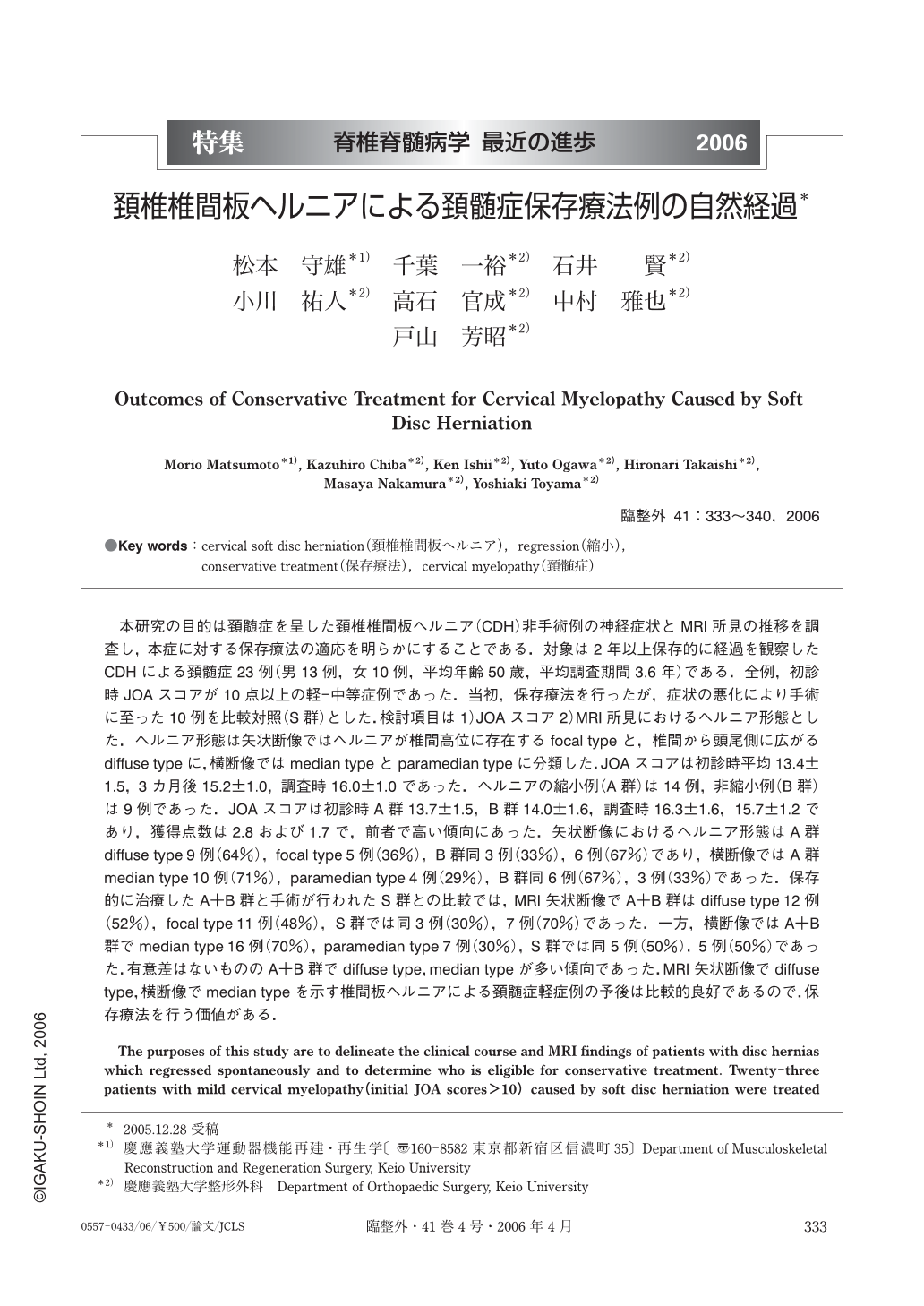Japanese
English
- 有料閲覧
- Abstract 文献概要
- 1ページ目 Look Inside
- 参考文献 Reference
本研究の目的は頚髄症を呈した頚椎椎間板ヘルニア(CDH)非手術例の神経症状とMRI所見の推移を調査し,本症に対する保存療法の適応を明らかにすることである.対象は2年以上保存的に経過を観察したCDHによる頚髄症23例(男13例,女10例,平均年齢50歳,平均調査期間3.6年)である.全例,初診時JOAスコアが10点以上の軽-中等症例であった.当初,保存療法を行ったが,症状の悪化により手術に至った10例を比較対照(S群)とした.検討項目は 1)JOAスコア 2)MRI所見におけるヘルニア形態とした.ヘルニア形態は矢状断像ではヘルニアが椎間高位に存在するfocal typeと,椎間から頭尾側に広がるdiffuse typeに,横断像ではmedian typeとparamedian typeに分類した.JOAスコアは初診時平均13.4±1.5,3カ月後15.2±1.0,調査時16.0±1.0であった.ヘルニアの縮小例(A群)は14例,非縮小例(B群)は9例であった.JOAスコアは初診時A群13.7±1.5,B群14.0±1.6,調査時16.3±1.6,15.7±1.2であり,獲得点数は2.8および1.7で,前者で高い傾向にあった.矢状断像におけるヘルニア形態はA群diffuse type 9例(64%),focal type 5例(36%),B群同3例(33%),6例(67%)であり,横断像ではA群median type 10例(71%),paramedian type 4例(29%),B群同6例(67%),3例(33%)であった.保存的に治療したA+B群と手術が行われたS群との比較では,MRI矢状断像でA+B群はdiffuse type 12例(52%),focal type 11例(48%),S群では同3例(30%),7例(70%)であった.一方,横断像ではA+B群でmedian type 16例(70%),paramedian type 7例(30%),S群では同5例(50%),5例(50%)であった.有意差はないもののA+B群でdiffuse type,median typeが多い傾向であった.MRI矢状断像でdiffuse type,横断像でmedian typeを示す椎間板ヘルニアによる頚髄症軽症例の予後は比較的良好であるので,保存療法を行う価値がある.
The purposes of this study are to delineate the clinical course and MRI findings of patients with disc hernias which regressed spontaneously and to determine who is eligible for conservative treatment. Twenty-three patients with mild cervical myelopathy (initial JOA scores>10) caused by soft disc herniation were treated conservatively for more than two years (13males, 10 females, mean age;50, mean follow-up 3.6 years). The investigated items included JOA scores and MRI findings (morphology of disc herniation, ). Morphology of disc herniation was classified into focal type (herniated mass persisting at the intervertebral level) and diffuse type (herniated mass migrating rostrally or caudally) in the sagittal plane and median type or paramedian type in the axial plane. The mean JOA scores were 13.4±1.5 before treatment, and 16.0±1.0 at follow-up. Regression of herniation was observed in 14 patients (Group A), while no regression was seen in 9 patients (Group B). The JOA scores were 13.7±1.5 (Group A) and 14.0±1.6 (Group B) before treatment, and 16.3±1.6 and 15.7±1.2 at follow-up, respectively. On sagittal MR images, diffuse-type herniation was observed in 9 patients (64%) and focal-type in 5 (36%) in Group A, and 3 (33%) and 6 (67%) in Group B, respectively. On axial images, median-type herniation was observed in 10 patients (71%), and paramedian-type in 4 (29%) in Group A, and 6 (67%) and 3 (33%) in Group B, respectively. Spontaneous soft disc regression in patients with cervical myelopathy was observed in more than half of those treated conservatively for longer than 2 years. Conservative treatment can be recommended for patients with mild cervical myelopathy, especially when caused by median-and/or diffuse-type disc hernia, although close observation is mandatory.

Copyright © 2006, Igaku-Shoin Ltd. All rights reserved.


